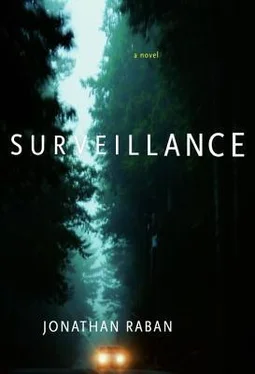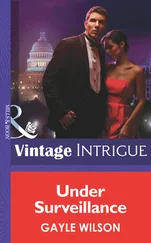A soldier probed under the Spider with a mirror on a short pole, checking for bombs. Another demanded ID.
She gave him her driver’s license.
“National ID?”
“I d-d-d-d-don’t have it yet.” No one she knew did.
“You know the deadline.”
“Yes.”
“Get it. Soon.”
A third soldier, this one female, said, “Out the car,” and brushed Lucy’s body head to toe with a metal-detecting wand.
She wasn’t tempted to joke with any of these characters, so much less human-seeming than their dogs, who at least showed some interest, even eagerness, as they stuck their heads inside trunks and jumped onto backseats. The handsome yellow lab bitch assigned to the Spider gave the car a thirty-second shakedown and found it innocent. Offering her a biscuit, Lucy thought, would likely get you shot on sight.
Through her flip-flops, the hot tarmac felt like a griddle. She dug her old linen sun hat out of the glove compartment and sat in the open car, torpidly watching the soldiers and dogs going about their business. You could never predict security: sometimes it was nonexistent, and then — usually at the most inconvenient times — it was everywhere around you, obstructive, tedious, intrusive, rude. No explanations were ever given; the authorities seemed to take sadistic pleasure in keeping the public in the dark.
They treat us like children. Whatever was going on, the grown-ups weren’t telling. Robbed of information, people childishly filled the vacuum with fantasy and rumor. Some saw the security apparatus as blatant playacting; others took it in deadly earnest. Lucy knew people so spooked that they now refused to fly, enter tall buildings, or cross long bridges for fear of being blown to bits by an enemy they couldn’t name — pure self-indulgence, in her view. But she had little more patience with those like Tad, with his oddly cheerful Internet conspiracy theories, his breezy conviction that the whole thing was a gigantic hoax perpetrated by a criminal administration on a clueless electorate. So she oscillated uncomfortably between being somewhat scared and somewhat skeptical, never quite one or the other: an agnostic on this as on so much else, a little envious of the true believers for their easy certitude.
She’d always had a problem with arriving at a confident point of view. In Lucy’s experience, almost every case had merit on both sides, and she had an unhappy knack of riling both whenever she incautiously threw in her two cents’ worth. Time and again she’d replayed the scene in the Miles City kitchen, her mother yelling, “You know what’s wrong with you? You have as much personality as a piece of blotting paper!” And when Lucy considered this accusation, found a speck of merit in it, and replied calmly that since her mother had such a superabundant personality, she’d never felt any great need to cultivate one of her own, she’d nearly been brained by a flying plate.
A ferry came, swallowed half the vehicles on the lot, and went. Lucy called Tad on his cell phone and found him home already: apparently the nuclear catastrophe had been called off early to allow rush-hour traffic through on Route 99. He’d been only slightly injured, he said, and yeah, sure, he could pick up Alida before six from her after-school program.
“So how’s Vanags?”
“Oh, he’s like, Reagan was the greatest president in history, and I’m like, Yeah …”
A mile off on the water, the ferry let out a belch of diesel smoke from its funnel, and for a split second Lucy imagined it shuddering from an explosion deep in its guts. How long would it take a ferry to go down?
“That’s our Professor Vanags.”
Putting the phone back in her bag, Lucy felt a stab of disloyalty to Augie; she’d said that only because it was the sort of thing Tad liked to hear. She needed to get August Vanags down on paper, but in the round, not as Tad’s cartoon reactionary. She propped her notebook against the steering wheel and scribbled, “presidential cuff links & presidential library,” then “gumboot chiton,” then “neediness,” then “Slang— dollars to doughnuts … peepers … put the kibosh on. ” Looking up from the too-bright dazzle of the page, she saw she’d drawn the attention of a soldier with a glassy, incurious stare. When she made herself smile at him, his eyes drifted lazily, indifferently away.
There was a stir of activity in the lines as a blue Chrysler sedan with B.C. plates was escorted to the far corner of the waiting area, where a bunch of soldiers disemboweled it, pulling out heaps of decent-looking luggage, carpets, papers, headrests, tools, the spare tire. A book was passed from hand to hand, a silver thermos bottle held aloft like a rare trophy and carried to the nearby Humvee. One guardsman weighed in his arms a large cellophane-wrapped teddy bear, as if to price it; another, spread-eagled on his back on a wheeled sled, scooted underneath the chassis, flashlight waving.
The baseball-capped driver, flanked by unamused soldiers, weapons at the ready, was clowning for the crowd. Hopping from foot to foot, he shrugged and showed his palms in a dumb show of astonished innocence, all the time beaming at his audience with a chimpish grin. Heh, heh, heh! Look what I got into! Just my luck, huh?
Lucy was with the soldiers on this one. Had she been in charge, she’d have given the guy the works, too. Khaki-skinned, implausibly single, Canadian-plated, he looked like trouble incarnate, and shit-eating fraudulence was written all over that grin. She’d have turned him back at the border — and if he’d crossed at Blaine, why had he taken this devious route through Whidbey Island? She hoped the soldiers would hold him for a good while yet; she didn’t want to travel on the same ferry as that joker. Years back, she’d written a “Talk of the Town” piece about the arrest of Ahmed Ressam, the Algerian terrorist who’d planned to blow up LAX, at the ferry terminal in Port Angeles, and this guy looked like Ressam’s double.
Then she jolted into reverse. This was stupid “profiling”; no real bomber would so neatly fit the stereotype; and catching stereotypes was the ineffectual best that the army and police could do. Studying the man again, his pathetic jiggling dance, all she saw was bemusement and fear — the natural creaturely terror of someone entangled in the workings of an enormous, incomprehensible military machine. The guy looked like he was peeing his pants — and suddenly Lucy found herself with the ACLU.
He was still under military detention when the next ferry showed, wallowing like a hippo at the dock head. It took an age to empty, then, at last, the lines of cars began to move. As Lucy turned on the Spider’s ignition, she saw that the suspect was being allowed to reload his baggage into the Chrysler. Most likely, he’d make this ferry after all. Despite herself, she couldn’t help wishing the soldiers had held on to him for just five minutes more.
Climbing the crowded stairwell to the lounge, notebook in hand, she was back to thinking about August Vanags. Out on the gravel, saying good-bye, he’d looked melancholy at losing his captive audience. “Next time you must stay the night — and do bring your little girl. We have acres of space here, and Minna loves to have kids around.” It’d be no fun for Alida, but Lucy wasn’t above resorting to bribery and main force. Next time she’d bring her cassette recorder, small enough to nestle unnoticed in her bag, to collect Augie’s weird speeches on tape. After her New Yorker piece on Bill Gates came out, Gates himself had dropped her an e-mail complimenting her on her “great memory.” Little did he know.
She was looking around the lounge for a table where she could settle down to making notes when she saw them — the knotted pink silk scarf, the gold chain, the cashmere blazer, the man with his patrician drinker’s face, and the frail-looking wife, glossy real-estate brochure spread on the table between them. Lucy’s first thought was that by some miracle they’d survived their fatal accident, her second was that her own wits were deranged.
Читать дальше












